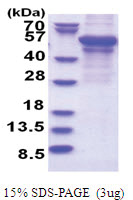Adipophilin / ADFP (1-437, T7 tag) Human Protein
Other products for "PLIN2"
Specifications
| Product Data | |
| Species | Human |
| Expression Host | E. coli |
| Expression cDNA Clone or AA Sequence |
MASMTGGQQM GRGSMASVAV DPQPSVVTRV VNLPLVSSTY DLMSSAYLST KDQYPYLKSV CEMAENGVKT ITSVAMTSAL PIIQKLEPQI AVANTYACKG LDRIEERLPI LNQPSTQIVA NAKGAVTGAK DAVTTTVTGA KDSVASTITG VMDKTKGAVT GSVEKTKSVV SGSINTVLGS RMMQLVSSGV ENALTKSELL VEQYLPLTEE ELEKEAKKVE GFDLVQKPSY YVRLGSLSTK LHSRAYQQAL SRVKEAKQKS QQTISQLHST VHLIEFARKN VYSANQKIQD AQDKLYLSWV EWKRSIGYDD TDESHCAEHI ESRTLAIARN LTQQLQTTCH TLLSNIQGVP QNIQDQAKHM GVMAGDIYSV FRNAASFKEV SDSLLTSSKG QLQKMKESLD DVMDYLVDNT PLNWLVGPFY PQLTESQNAQ DQGAEMDKSS QETQRSEHKT H
|
| Tag | T7-tag |
| Predicted MW | 49.3 kDa |
| Concentration | lot specific |
| Purity | >85% by SDS - PAGE |
| Buffer | Presentation State: Purified State: Liquid purified protein Buffer System: 20 mM Tris-HCl buffer (pH 8.0) containing 0.4M UREA, 10% glycerol |
| Preparation | Liquid purified protein |
| Protein Description | Recombinant human PLIN2, fused to T7-tag at N-terminus, was expressed in E.coli. |
| Storage | Store undiluted at 2-8°C for one week or (in aliquots) at -20°C to -80°C for longer. Avoid repeated freezing and thawing. |
| Stability | Shelf life: one year from despatch. |
| Reference Data | |
| RefSeq | NP_001113 |
| Locus ID | 123 |
| UniProt ID | Q99541, Q6FHZ7 |
| Cytogenetics | 9p22.1 |
| Synonyms | ADFP; ADRP |
| Summary | 'The protein encoded by this gene belongs to the perilipin family, members of which coat intracellular lipid storage droplets. This protein is associated with the lipid globule surface membrane material, and maybe involved in development and maintenance of adipose tissue. However, it is not restricted to adipocytes as previously thought, but is found in a wide range of cultured cell lines, including fibroblasts, endothelial and epithelial cells, and tissues, such as lactating mammary gland, adrenal cortex, Sertoli and Leydig cells, and hepatocytes in alcoholic liver cirrhosis, suggesting that it may serve as a marker of lipid accumulation in diverse cell types and diseases. Alternatively spliced transcript variants have been found for this gene. [provided by RefSeq, Mar 2011]' |
| Protein Families | Druggable Genome |
Documents
| FAQs |
Resources
Recombinant Protein Resources |
{0} Product Review(s)
0 Product Review(s)
Submit review
Be the first one to submit a review
Product Citations
*Delivery time may vary from web posted schedule. Occasional delays may occur due to unforeseen
complexities in the preparation of your product. International customers may expect an additional 1-2 weeks
in shipping.






























































































































































































































































 Germany
Germany
 Japan
Japan
 United Kingdom
United Kingdom
 China
China
